#over policing
Text
"For millions of Americans, their primary interaction with the state is through its policing apparatus. They live in these communities, they live in these neighborhoods where they are surveilled, and followed, and policed in ways other citizens are not. And that forms kind of the bedrock of their relationship with the state.
And because their relationship with the state is formed in this very antagonistic way, in this way that renders them vulnerable to all kinds of threats, up to and including being killed, that produces a different kind of “citizenship” or understanding of citizenship, right?
If you area middle class person in a middle class neighborhood and your kids go to a decent school, and maybe you go vote every couple of years, and you go to the municipal office to fill out paperwork, get permits or whatever… a trash decal for your trash can, and you go to the DMV. You might be frustrated at times, but generally speaking you’re going to be treated as if you are a citizen who matters, right? Like what you say matters, what you think matters, like, people will show concern for you. But if your primary relationship with the state is through the police, that’s not the case. You’re not going to be treated as a citizen who matters. The fact that your neighborhood is being surveilled in these ways that you KNOW other neighborhoods are not, signals to you that the state doesn’t even think of you as an equal citizen. It thinks of you as a potential criminal threat.
And so what (Velsa) Weaver and (Joe) Soss argue, and what Weaver finds in previous work that she’s done, is that for citizens who exist in this kind of relationship to the state, they tend to not participate in politics, they tend to have a very pessimistic view of the ability of the government to do anything for them in their lives, and they kind of just drop out of the political system entirely.
And I think it’s important when we’re thinking about policing, not to simply look at this as a question of, “Well how can we get the police to stop doing violence?” That’s important, but we shouldn’t simply look at it as a question of how do we get the police to stop being biased. I think we need to broaden our view and think about what is the relationship of policing itself to citizenship, to democratic life, and how does that affect people?
How do people who live their lives with constant police contact understand themselves as citizens and what does that mean for our politics?
If you are from a community for whom police contact is regular, which is itself a negative thing… I grew up in like a regular middle class neighborhood, nothing special. And the police just like weren’t there. There were no cop cars, patrol cars going through. It just wasn’t a thing. It wasn’t until I would visit friends who lived in more low-income neighborhoods, more segregated neighborhoods that I would ever see police cars. But they just weren’t in the neighborhood I grew up in.
And that kind of regular contact… and again, people know, right? I sometimes think that there’s this idea that the people who are under regular police surveillance aren’t aware that they’re being treated differently, but they are. They’re very aware of it. And that kind of constant police contact… and if you’re a young man of color in these neighborhoods, the odds that you’re going to be stopped or even roughed up are pretty decent. Again, that fundamentally shapes your orientation towards the state and to your own sense of your own citizenship.
Now, the response to all of this, and I can imagine it very clearly, is, “Well these are places where there’s lots of crime, so you need the police there.”
There’s two things to say to that: The first is that, crime is everywhere. I went to the University of Virginia, a very lovely school where lots of kids did drugs. They did illegal drugs. Right? And this is the case with any elite university. There are going to be a lot of kids doing illegal drugs. But there aren’t cops patrolling the frat houses looking for people doing illegal drugs. There are cops patrolling the public housing facilities looking for people doing illegal drugs.
So the crime is happening everywhere. Even violent crime, but the cops aren’t everywhere. And that’s because some people are seen as being deserving of surveillance because they might be potential criminals, and other people are not seen as being potential criminals. And that’s the perception people do actually understand, and that’s what shapes how they view the state, how they view the government, how they view themselves in relation to those things.
If you’re calling your squad the Scorpion Squad, that sort of gives the game away. The “Scorpion Squad” isn’t going to be a place where there’s like sensitive community oriented policing. It’s the Scorpion Squad.
There is an observation that’s been made many times by many observers over the years in these Black and Brown communities, by people who have worked in them and who studied them: which is that, the people in these communities they want something to be done about crime. Like, no one likes to be exposed to violent crime, people want something to be done about it. But very often, police departments aren’t really policing violent crime. They’re not solving murders, they’re not preventing murders or any kind of other violent offenses. What they’re doing is quality-of-life policing. They’re sweeping people off of the streets, they’re harassing people who might “look suspicious,” but they’re not doing the kind of police work that might actually reduce violence.
And so you have this paradox where people are over-policed by things like the Scorpion Squad. You know, stopping a motorist and then beating them to death. But like also probably harassing just people hanging out living their lives on the street. But then they’re also simultaneously under policed in the kinds of things that people want taken care of. If you read any work about the crime spike back in the 80s and 90s, and listened to what these people were talking about, or if you just sit in on a public meeting, right, and people are just speaking to their representatives or to law enforcement, what you’ll hear is essentially, “Why don’t you spend less time harassing my kids and more time finding the people who shot this guy?” That’s what people want, but it’s precisely because the people collectively in the neighborhood or the community are viewed as “potentially criminal” that law enforcement doesn’t make that kind of distinction.
It doesn’t make the distinction between a bunch of kids just hanging out on a corner, because that’s what kids do—to reference my own childhood again, I spent a lot of time hanging out in the Walmart parking lots, which is just kind of what kids do—versus people who are genuinely dangerous. Which, to make that kind of distinction, it requires you to do more than simply drive around in a cop car. It requires you to build relationships. It requires you to treat the people you encounter as citizens worthy of protection, and not as potential suspects."
- JAMELLE BOUIE, Police As Government
110 notes
·
View notes
Link
77 notes
·
View notes
Text
“Marginalized young people who encounter racialized punitive treatment are “not just humans-in-the-making, but resourceful social actors who take an active role in shaping their daily experiences.” I found that the young men in this study recognized, had a clear analysis of, and were resisting the criminalization they encountered. This resistance came in different forms. Some resisted by committing violent crime, others by organizing themselves and blocking off their streets with stolen cars and concrete slabs so police cars were unable to access them; and others resisted by becoming political organizers and returning to school. Much of the literature on mass incarceration has not been able to account for agency and resistance in the people most impacted by the punitive state.” (41)
- The Flatlands of Oakland and the Youth Control Complex by Victor Rios
#literature#quote#marginalized groups#black community#Black History month#History of Oakland#oakland#culture#ghettos#criminalization#over policing
3 notes
·
View notes
Text
The Jacksonville shooter (whose name I shall not write) ultimately killed three innocent Black Americans at a Dollar General Store only after he was first spotted at nearby Edward Waters University (EWU).
As the shooter donned his bulletproof vest, some EWU students eyed what they believed to be a suspicious person.
The students at the Florida historically black institution immediately alerted a nearby security guard who approached the suspect near his car. Upon seeing the officer, the suspect fled in his car toward what would be his next target.
Had the cowardly shooter not turned the weapon on himself after killing three innocent Americans at the discount store, his first encounter at Edward Waters University would have been more than strong trial evidence that his plan was to kill Black Americans.
In plain language, the Jacksonville shooter was engaged in a terrorist plot.
“Terrorist” is defined (rather circularly) by Webster’s dictionary as
“relating to, or characteristic of terrorists or terrorism: practicing or involving violent acts of terror.”
The key to the definition is that terrorism involves acts of violence.
One might imagine one of the definitional requirements of terrorism would be the use of violence to achieve political or cultural objectives, but Webster’s ignores this element.
But, we know from our recent history, terrorism can be simple violence calculated to induce fear and terror in its victims — and its victims are most often those who are identifiable and insular — those who are either vulnerable minorities or protected class members.
This is a pattern that is clear from the racist massacres dating from the era of post-Civil War Reconstruction until last week in Jacksonville.
But had these recent incidents been perpetrated by any identifiable non-American, this nation would have acted swiftly to prevent future atrocities through passage of anti-terrorism legislation and would have appropriated funds for both the FBI and DOJ to investigate and prosecute them “to the full extent of the law.”
Instead, in the wake of the repeated attacks, national and local politicians recite a litany of delay and denial mixed with indifferent thoughts and belated prayers about the deaths of their fellow countrymen and women.
Instead it is past time to act.
They must denominate these clockwork-like acts of violence as real terrorism; and, in doing so must both legislate and appropriate the resources necessary to prevent them.
But to do this they must first confront a hard truth — the truth that the most dangerous terrorists in our midst are other Americans: mainly radicalized young white Americans who seek to kill and terrorize their own neighbors — Americans who are Jewish, Black or Hispanic.
The same fervor to fight terror which once spread across all spheres of politics after 9/11 seems to have evaporated in the last half decade once the incidence of terror evolved to acts against Americans by other Americans.
But that doesn’t change the state of reality.
#America needs an anti-terrorist act for the terrorism in our midst#mn#cops#over policing#minorities in america#anti terrorist act#homegrown terrorism#white supremacy with qualified immunity
5 notes
·
View notes
Text
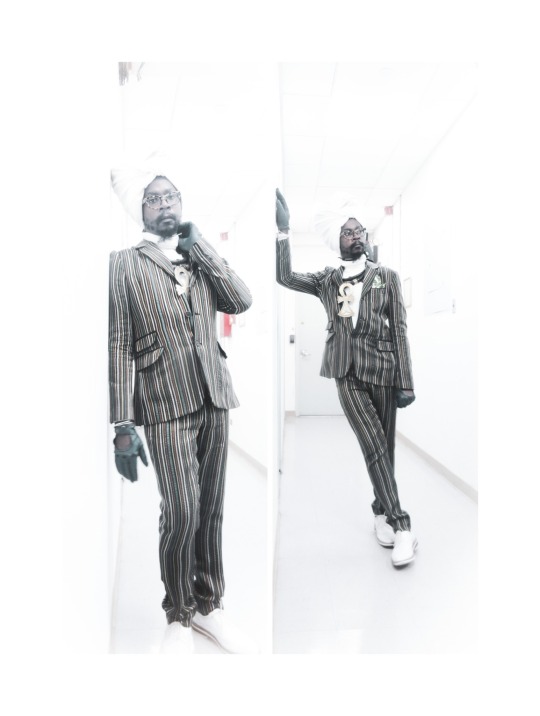
I've Never Been Stopped by a Cop
I’m a Black man living in New York City and I’ve never been stopped by the police. I suppose I should be more specific, I’ve never been stopped and frisked by the police. And for absolute transparency I have gotten summons, two for riding my bike on the sidewalk and one for trespassing which I deliberately did fully aware that a patrol car was watching but that isn’t this story.
I was participating in a discussion amongst Black men and a scenario where police pulled guns on me and my family in our car as we pulled up to our home. Umm first I’m a bachelor and haven’t any children, so this scenario is dead in the water. A college friend that was in my breakout group prodded an adjustment to the scenario and I stated something equivalent of the first sentence in this piece. The bigger question was why hadn’t they? And for purposes of discussion I’m a dark-skinned Black person with locs that reach to tip of my spine. You would think that this would make me a prime candidate for getting swooped up in some mistaken identity situation but that has never happened.
As a child my interaction with police was negligible if not totally non-existent. I want to be careful not to get into respectability politics, but I was a good kid and a fair teenager. I can recall an incident in high school where a couple of my friends had gotten pinched by Tower Records security for shop lifting some CD’s, and I was with the ladies one who was clearly of European descent the other Latina, we called ourselves 3-2-1 Contact because of our natural diversity. Our understanding of the law seemed to differ greater than our ethnic backgrounds.
I have always been a sensible person even as a child, I was never prone to peer pressure ever, I had a clear understanding of my mind and what I would do and what I wouldn’t do. It didn’t seem particularly sensible to me as a young Black male to be participating in petty theft especially in a neighborhood adjacent to Lincoln Center, where we went to school. Furthermore I was being raised in a very Christian home by my grandparents who would be disappointed in me for not using good sense.
My mother had always encouraged me to use ‘common sense’ it seemed to be the most important thing in the world and even though she had passed, her lesson had not. Common sense ruled my decisions in a way that made me a pariah amongst my peers. I had no interest in drinking having witnessed drunken family members be abusive to others, I also hadn’t the slightest desire to try that wacky tobacco that seems so intertwined with adolescence. My father and mother both partook of the herb and as a boy I had said not for me to all of the vices and even within the last decade sex, but that is another story.
In all attempts to disseminate all pertinent details I think it’s also good to know I’m a pedestrian, and most of my peer group is probably tired of me talking about how this is a multi-generational trait going back as far as my great grandfather. But like myself and his other son my father never had a drivers license, which is and isn’t peculiar to me because like him I was raised for a time in a two car home and hadn’t the slightest bit of interest in learning to drive still don’t. I haven’t been invited to that century old club of Driving While Black because well I don’t drive.
I do walk though and ever since my dad dragged me all over New York City on subways and buses, I have always walked with a clear destination and purpose. I’m not a lingerer I’m a fast paced impeccable dressed New Yorker. I’m not sure if my pace has made me seem less suspect or the fact that my fashion lends itself to a very non-traditional urban style. This too was a choice I made in my formative years when my peers were running around trying to follow the latest fad in clothing I made a clear attempt to distinguish myself with my unique choices.
Some of these decisions were made because I thought my grandparents had a fixed income, my grandmother was the No Frills Queen, this was a generic store brand often found at Pathmark. I wouldn’t learn till way into my adulthood that I was being raised in a two income middle class household. This is important because my clothes were purchased by my grandmother usually at the Macy’s discount outlet or Burlington Coat Factory.
Due to my mother’s passing and my separation from my siblings, I was a bit withdrawn as a pre-adolescent and teenager. I would stay in the house making my own toys, reading comic books and creating my own worlds which I never really left unless I had to go to school or church on Sundays. Once again I’m not attempting to justify the behavior of the white supremacist tendencies of the NYPD, but I wasn’t a typical child and I grew into an atypical adult.
A queer adult who currently identifies as non-binary transgender. But when I was still gay and had a penchant for wearing Daisy Dukes and thigh high moccasins I still never fell under the purview of the boys in blue, I even dated a couple of cops who in my opinion had a bit more baggage than your average date.
I’m left with the question what about me makes me worthy or unworthy of being stopped and frisked? Does my non-traditional performance of masculinity factor in the equation or is in my private college education? I didn’t even know I was being raised in an upper middle class household but I did know that I wasn’t living at the poverty level anymore not that I even knew that because my life was so full of abundance. My dark chocolate complexion which had faced all kinds of colorism, didn’t seem to rate.
What makes some Black people suspects and others not?
[Photo by Brown Estate]
#stop and frisk#over policing#police violence#black men#racism#Tower Records#shoplifting#321 Contact#common sense#Macy's#burlington coat factory#middle class#fashion#white supremacy#hate#queer#non-binary#transgender#gay#gender divergent#masculinity#feminine sissy#colorism
2 notes
·
View notes
Text
It doesn't mean anything that you protested the police who killed George Floyd if you too would have made the 911 call that put the police on his neck.
Olayemi Olurin
02 June 2023
"Stop Romanticizing the George Floyd Protests"
Olurinatti
#quote#over policing#police brutality#state violence#criminal legal system#criminalization#policing#protest#911
1 note
·
View note
Text
Is this justice? Is this what we want our tax dollars supporting? Are we making our society safer for anyone this way?
A snippet from the article:
Black individuals are more than twice as likely to be convicted of a crime than their white counterparts and more than three times as likely to be convicted of a felony or probation violation. Black individuals are also almost nine times more likely to be incarcerated than white individuals.”
#racial justice#justice#discrimination#racial discrimination#racial equality#clean slate#clean slate law#connecticut#connecticut clean slate law#criminal justice#over policing
0 notes
Text
Dustin denotes his plan as a stroke of genius. Steve calls it fucking crazy.
It is crazy — going down to the police station and giving a completely faux alibi for Eddie is crazy.
But then, Steve recalls the handcuffs on the hospital bed, keeping him strapped in even though Eddie’s hardly in a state for escape, all bandages and wires. Steve remembers the fitful sleeps he’s witnessed when visiting, remembers Eddie’s ashamed whisper of fear that one of the officers would smother him in his sleep if no one stayed with him.
Steve remembers the bats. Remembers all the other shit Eddie got dragged through.
And if Steve can lessen that blow… well, then maybe he is crazy for going through with the plan.
There’s no prepping Eddie for it, of course, considering he’s being guarded around the clock. Steve thinks it’s ridiculous considering how feeble he feels just looking at Eddie. When he— when they had gotten him out, there was a moment where he was more blood than boy. Just jagged skin held together by Steve’s hands and sheer will.
He shivers involuntarily. This is crazy, Steve thinks, shifting a bit in the chair out the front of Eddie’s room, waiting for the discussion across the hall to meet its end. It’s crazy, but he’s already done it now.
Sharp footsteps sound across the hallway and Steve’s head yanks up. His heart beats too fast and he presses his palms down into his jeans to wipe them, standing up quickly.
“So?” He asks, eyes darting between Chief Powell and Deputy Callahan.
“That’s quite the alibi you’ve provided, Mr Harrington.” There’s a cool expression on Chief Powell’s face, giving away nothing. “One that not many would be so willing to give.”
Steve swallows. Presses down the panic tied to the implications of what he’s told them— him and Eddie. Him and Eddie together.
“We’d like to question Mr Munson a little as well, get everything settled. You know,” He makes a little gesture with his hand. “Make sure your stories line up.”
A new strain of panic jolts in Steve’s stomach and he hopes it doesn’t show on his face. Glancing over his shoulder, he peers between the blinds and tries to find Eddie’s face. He can only see the hospital bed, stark white sheets and hundreds of tubes. Steve tries to remember that he anticipated this, he prepared for this.
“Now?” He asks, turning back to face the officers. He tries to appear like his uneasiness comes from concern, instead of panic. “He’s just had another dose of morphine, I’m not sure how up to questions he’ll be.”
Chief Powell narrows his eyes. Steve silently begs him to take the bait — he doesn’t want to defer the questioning, he just needs a little more wiggle room in case Eddie is slow on the uptake. He’s a performer though. Steve hopes that’ll be enough to convince them.
“Now is best.”
Steve nods, his face grave. “I understand. Just… if he’s a bit slow, give him time to find his answers. He doesn’t know that I’ve… told you.”
Steve’s hand presses down on the handle to the room and the door opens with a hiss. He enters the room, his eyes landing on the officer posted by the door first before they travel onto the bed, to Eddie.
The chair beside the bed is empty for now which means Wayne must be off getting some food. Good, Steve thinks. This will be easiest with a smaller audience to convince.
Eddie’s eyes are closed, resting as best he can, but at the new noise they peek open. The ripple of happy emotion will help their case immensely but Steve delights in the fact that that reaction is genuine. Eddie is happy to see him.
“Big boy!” He rasps as a greeting. He waves one hand up, wires sticking out of it and the handcuff on it clinks uncomfortably, and he begins a spiel. “Welcome back to my humble—”
He cuts himself off when he sees there are other visitors today besides Steve. The heart monitor jumps and Eddie’s hand drops, eyes back onto Steve in an instant.
“What’s going on?”
Steve strides to his side, his hand reaching out to curl his fingers around Eddie’s limp hand. His skin is cool to touch, fingers icy. Surprise jumps onto Eddie’s face but his fingers tighten their grip, holding his hand too. Steve sits down in the seat beside the bed and lets the real nerves of the situation make his voice tremble when he speaks.
“I— I had to tell them, Eddie. About your real alibi.”
To his credit, Eddie only lets confusion wash over his face for a moment before it turns to some mixture of anger and sadness. A furrow forms between his brows, his grip on Steve’s hand tightening, and Steve doesn’t think he’s acting at all when he says, “You didn’t.”
Huh. Maybe he’s figured it out after all, Steve thinks.
Steve nods solemnly, letting his thumb wander over the back of Eddie’s hand. He remembers what it’s like to dote on girls, on Nancy, and find it’s not nearly as hard to bring it all out for Eddie either.
“I had to,” He murmurs, reaching a hand out to brush back some of Eddie’s hair. The heart monitor spikes again and Eddie’s cheeks glow pink.
Behind them, Chief Powell clears his throat and Steve jumps, remembering himself and what he’s trying to accomplish here.
“Excuse us, Mr. Munson, we have a few questions for you.”
There’s a moment where they let their words register and Eddie takes a deep breath, squeezing Steve’s hand and giving a little nod. Chief Powell continues.
“Mr. Harrington here has come forward with a statement that would place you elsewhere than the scene of the crime at the time of Miss Cunningham’s murder. Can you recall where you were that night?”
The mention of Chrissy’s name makes Eddie flinch and Steve’s glad he’s already holding his hand so he can squeeze it gently. Eddie’s gaze drops to their intertwined hands and stares hard for a moment. Shuffling puzzle pieces into place.
Steve leans down, presses a soft kiss to his bruised knuckles, and says “Tell them the truth.”
Eddie inhales sharply, steeling his nerves and turns his attention back to the officers. “I was with Steve. We were… we were at his house.”
Chief Powell nods, scratching words down in his notepad. He hums in a way that tells Eddie to keep going.
“We were…” Eddie trails off and looks to Steve, trying to follow the story already planted. Steve nods, hoping it comes off like he’s trying to be comforting boyfriend, instead of a subtle nudge.
“…Kissing.”
Steve resists the urge to snort at the absurdity of the whole situation. This whole thing is so convoluted and it’s twisted that Eddie’s even been accused but Steve’s putting his fuckin’ reputation on the line and Eddie says they’ve been kissing?
He doesn’t even need to turn around to know some eyebrows have raised behind him.
“Kissing?” Steve hears Chief Powell repeat. “Just… kissing?”
Eddie’s attention snaps forward again and Steve can see him piece together the snappy persona, the Freak, the scary dog privileges that come with being an outsider. He straightens up a bit, shoulders squaring but Steve can feel the quake in his hand.
“I’m sorry, did you want a play by play of the whole act, Chief Powell? I can go into detail if you want, who took who’s pants off first, yanno, but I didn’t peg you for that kinda guy.”
Steve can’t miss this reaction, turning his head to watch both officers shuffle uncomfortably on the spot. Chief Powell tries to keep his power, eyes narrowing, but it’s hard to maintain when Steve dots another quick kiss across Eddie’s knuckle.
“Very well.” He seems to land on. “We’ll be back to collect a formal statement later—”
Eddie gives a faint squeak, his hand grasping Steves that much tighter.
“—but I’m happy to have the guard and cuffs removed from your room for now.”
A sigh so large escapes Eddie that his chest deflates a good couple inches and Steve feels his own shoulders relax a bit. Chief Powell steps forward, key retrieved from his belt and Steve winces seeing the ring of irritated skin around Eddie’s wrist. No doubt caused from the thrashing of night terrors.
He releases Eddie’s hand long enough for it to be freed, scooping it back up in his as soon as he can, properly this time. All fingers intertwined, palm to palm. Eddie eyes their hands again and Steve pretends to not hear the jump in the heart monitor.
The officers leave, including the one holding post, the door sliding shut with a gentle click and Steve holds himself still— unsure of how to start explaining what he had sprung on Eddie. He feels bad, dropping him in the deep end, even if it was for his own good.
“Eddie—” He starts.
“Hug me.” Eddie hisses out the corner of his mouth. When Steve doesn’t react, he says it again, fiercer - it doesn’t match the way he’s smiling so sweetly at Steve. “Hug. Me.”
Steve does as he’s told, shooting up onto his feet and hesitating only for a moment before Eddie’s arms are creeping around his waist — he leans over and tries to keep his weight off him. Eddie’s frazzled curls tickle at his cheek and Steve just burrows his face in further.
There’s a faint whisper into his ear. “They were watching still.”
Steve pulls back a bit, not to check over his shoulder, but to see Eddie’s face. He’s serious, eyes skirting the window behind them but the moment Steve pulls back, his eyes shift down and he softens.
“And now… kiss me too?” He says. His tone conveys that he knows he’s being far too cheeky. Steve’s wonders if the officers are still watching. Wonders if he’d still kiss him even if they weren’t. He casts a glance over his shoulder and is met with a empty window, the officers retreating down the hall.
He turns back to Eddie with an incredulous expression. “What? Getting you off murder charges not good enough for you?”
Eddie’s face shutters for a moment, as though every emotion to do with Steve’s sacrifice floods him at once. There’s a burst of gratitude when he doesn’t mention it — doesn’t mention everything Steve might be giving up for Eddie, everything that might crumble should the details of the case become public.
He chooses the joke again. Eddie always does.
“Yes, but remember, we’re madly in love,” Eddie sings, brows wiggling about on his face and making Steve snort. “So feel free to kiss me anytime you feel like it.”
Steve snorts. “Duly noted, Munson.”
Eddie throws his head back softly against his pillow and pretends to wail in pain. “Munson? That’s all I am to you? That’s how you treat your boyfriend?”
Steve can’t help but grin a little at the theatrics and finds himself thinking that of all the people to be stuck pretending he’s dating, at least with Eddie, it’ll be enjoyable. Well, at least interesting. It will certainly be an experience.
“You have no idea how I treat my boyfriends, baby.” Steve says, voice low, just to see if he can get Eddie’s heart monitor to jump again. It does, a steady beeping as the BPM climbs up a few numbers.
Steve can feel the blush on Eddie’s cheeks, he’s so close, and it’s so nice to see colour on his face — such a stark comparison to the paleness of- well, of older memories.
Steve grins. Despite every nerve that feels singed beneath his skin, overworked from all his anxiety — despite considering every potential backlash that faces both them outside this room, outside the hospital, Steve searches within himself.
He can’t find one single ounce of regret.
next part.
#gay ppl in my phone…. take this humble offering to tide u over between fics#everything has become long#i cannot help it#every idea is like 5k+ words#this is me trying to combat it#ruby writes steddie#steddie#steddie fic#steddie ficlet#pre steddie#steve x eddie#steve harrington x eddie munson#uhhhh that’s all folks#this is indeed the trope of steve telling the police they were fucking for their alibi lmao#10 points if u can guess which line is from the hunger games!#that’s what inspired this
5K notes
·
View notes
Text
every film maker should have one thing in mind: will this be a good gif?
#(i'm talking about that manny video. wtf is this?????? it was all over the place and the video was spinning and shaking)#like. one shot should be at least 50 frames ffs#with obviously no police or logo on it#film makers should commit to the fact that tumblerinas WILL gif their movie#and if they want their movie to be gif'ed well then they need beautiful shots#i'm looking at you baz luhrmann. your shots are so beautiful but they're like 15 frames#this should be punished by law
3K notes
·
View notes
Text
The Tyre Nichols Memorial Fund
Tyre Nichols was loved by his community and was known to be gentle, kind, and joyful. He loved skating and was originally from the Bay Area in California. He was known as someone “you know when he comes through the door he wants to give you a hug” and that “he wouldn’t hurt a fly.”
“He had never been in trouble with the law, not even a parking ticket. He was an honest man, a wonderful son, and kind to everyone. He was quirky and true to himself, and his loss will be felt nationally.”
Btw, the link includes a photo of graphic injuries. View with discretion.
#important#heartbroken over this :(#tyre nichols#gofundme#acab#black lives matter#black lives have always mattered#rip tyre Nichols#police brutality tw#police brutality#police murder tw#police murder#tw antiblackness#tw graphic injuries#tw police brutality#tw police murder#tw police violence#police violence tw#blm#upload#rest easy baby :(#heartbreaking.#please boost this.#please boost this#signal boost#tw graphic violence
10K notes
·
View notes
Link
5 notes
·
View notes
Text
meg baby, I promise we’ll all look the other way if you decide to strangle that chimera ant built bitch. I promise we won’t say nothing.
#nicki got to be one of the nastiest bitches I’ve ever seen in my life#you ain’t had a fucking hit in 10 yrs good enough to act the way you do#it’s crazy it took her being so vile to meg for ppl to get it#it’s always ‘protect blk women’ w/her until it’s somebody she don’t like lmao#and her only beef with her is that she collabed with cardi#the only one who stuck by her side mind you so ofc she#she’s been terrible and I remember back in 2017 when ppl jumped me for ‘defending a Latina woman’ over her#the same bitch that co opted a hashtag meant for missing and murdered blk women for her own bullshit#while cardi was using her platform to speak up for breonna Taylor and police brutality? oh okay#she’s a nasty witch and her karma will come#rap beef aside#‘how you got 3 Grammys and can’t stay on beat?’#how are you the supposed queen and been rapping since Jesus was in Jerusalem but have zero?#bringing up her dead mother..you deserve to rot#cherry chats 🍒#I’m so happy cardi no longer feeds into her bullshit and lets her stupid ass talk to the wall#all the new girls are outshining her and I’m so glad they don’t have to grovel to her#the fact that these girls just came out and are her competition says more abt nicki than it does Meg cardi latto or anybody else#her peers should be missy kim queen latifah etc#and yet she’s linking up with 23 year olds and beefing with girls 20 years her junior#guess that predator spirit run in the family huh
1K notes
·
View notes
Text
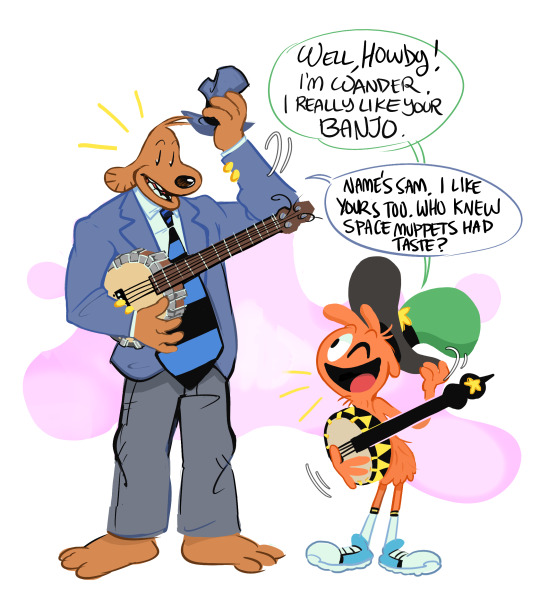
banjo buddies!
+ sylvia & max

#sam and max#wander over yonder#woy#sam and max freelance police#self indulgent crossover#wander woy#sylvia zbornak#sam and max freelance husbands
2K notes
·
View notes
Text
DP X DC PROMPT #28
(#) = Notes at the end of post
✦
Chartreuse
Due to the high levels of ambient ectoplasm, all the citizens of Amity Park gained a permanent change in eye color. They don't glow or flare in response to rampant emotions like true ghosts or the halfas though. They're just an unnaturally bright yellow-green.
The thing is, nobody else on Earth has this eye color, and it's never been seen in the human race until the recently graduated Amity Parkers started branching out to other cities to find jobs.
Nobody paid this any mind at first, though. Many just thought the individuals liked strangely colored contacts or it was a trick of the light. It's not until Danny and Tucker are both hired for positions in Wayne Enterprises that questions start popping up.
At first, the other employees thought the two might be related. It could happen, it's not that strange. However, when both of them said they're nowhere near related, just childhood best friends, it left everyone confused. If they aren't related and they aren't wearing colored contacts, then what are the odds of too completely unrelated people having the exact same strange and unseen eye color?
After a while, everyone just stops asking questions. After all, both men are easy to get along with and are excellent at their jobs, so a strange eye color isn't really something to complain about. Their stares were just a bit more intense than most people, and honestly, they've seen stranger things.
It helps that they've started seeing other people with the same eye color popping up in celebrity, sports, and activist circles. (1)
However, It's not until the power goes out during a late meeting/presentation, and Tim Drake accidentally turns on and shines his cell phone light into Tuckers eyes, that he starts seriously digging.
Needless to say, the animal-like green shine of his pupils scared the shit out of him and got him wondering if two of his new employees were part of a previously unknown alien race that'd recently settled on Earth without anyone noticing. When he looks into the middle of nowhere town they came from, this idea is even further cemented when he sees every person he finds a photo of have the exact same shade of chartreuse eyes. Ignoring the ghost rumors and "sightings" as just a strange tourist trap for the strange little town to make extra income, he brings the info he found to the other bats and birds.
They aren't exactly welcomed when they go snooping around Amity Park, unfortunately... (2 & 3)
✦
Now. To make this a bit more cracky, when confronted, do Danny and Tucker just come clean or do they milk the idea of them being aliens for all it's worth? (4) Add in a few strange, but perfectly normal for them, things they do that have people scratching their heads and make the assumption even worse/more irrefutable. This includes the unexplainable eye shine Tim discovered.
✦
(1) Paulina became a supermodel and is coveted for her striking eye color and beautiful complexion. Dash became a coach for a well known college in Metropolis, while Kwan became a fitness trainer and sponsor for health related items that actually work, also partnered with the college Dash coaches at. Sam became a notorious environmental activist and is the enemy of many companys who are determined to turn the world into a toxic wasteland. With the help of Danny's parents, she's found many eco-friendly chemical compounds that dissolve many of the toxic substances damaging ecosystems around the world. Etc, etc.
(2) Ectoplasm exposure has made everyone a bit more territorial over the town, including their protectors. They don't need outside heroes/organizations interfering with their work and don't/won't take kindly to the sudden interest hero organizations gain over them and their strange little town. That hasn't worked out too well with other government sanctioned organizations in the past and they don't want a repeat, thank you.
(3) Maybe Team Phantom even established themselves right around the same time or even before the Justice League was formed and they just flew under the radar until now. Maybe Amity Parkers feel a bit superior due to their seniority in having an excellent team in the know about the supernatural/non-human side of the world/universe? Who knows? You pick! Amity Park has been through a lot by themselves, so it's no shocker if they have an extreme amount of solidarity towards those they call their own.
(3 cont'd) Also! Since Amity Park has become so rich and saturated in ectoplasm over the years, they were eventually annexed/became an outside part of the Ghost Zone. Jack and Maddy are border patrol and any ghosts coming through need a passport now. Amity Park is basically a vacation hub for ghosts? Ghosts can freely roam the streets, they just don't wreak havoc anymore. That'd basically be terrorizing their fellow citizens at this point anyway and that's a no no. That means jail time with Walker. Amity Parkers also aren't afraid anymore and in fact CAN hit back now. This does not stop the Bat Clan and eventually the Justice League from thinking they're a town full of aliens tho. Some are just more human looking than others. Or they've been on Earth and procreating long enough with humans that their hybrid offspring have also started looking more human, is the ongoing conclusion.
(4) The Anti-Ecto Acts are not an issue here! Team Phantom already dismantled and annihilated the GIW years before they even thought of leaving Amity Park on its own. Before graduating highschool even. Yes, Team Phantom is perfectly self-sufficient and able to handle their own problems and have kept the city-wide ghost infestation pretty isolated outside a few events that were handled quickly and with the world none the wiser. So the world is still pretty ignorant of the existence of ghosts/the Ghost Zone. Would Team Phantom and Amity Park prefer to keep it that way though?
#dp x dc#dc x dp#everyone in amity park's eye color changed to chartreuse/yellow-green#the rest of the world finds this strange but it's whatever#weird things happen all the time in the dcu#tim thinks danny and tucker are part of an alien race#amity parkers are territorial over amity park because of radioactive green juice in the air#amity park is now part of the ghost zone just an outside part#competent team phantom#retired team phantom sorta#they're still on call if a new ghost shows up and gets any ideas but other than that they hung up the capes and ghost hunter gear#amity parkers are also feral enough to handle their own problems now#team phantom might as well be retired heroes turned annual trainers for new ghost hunters/liminal police recruits#danny phantom is NOT ghost king#danny phantom crossover#dp x dc crossover#dp x dc prompt#dpxdc#writing prompt#prompt
651 notes
·
View notes
Text
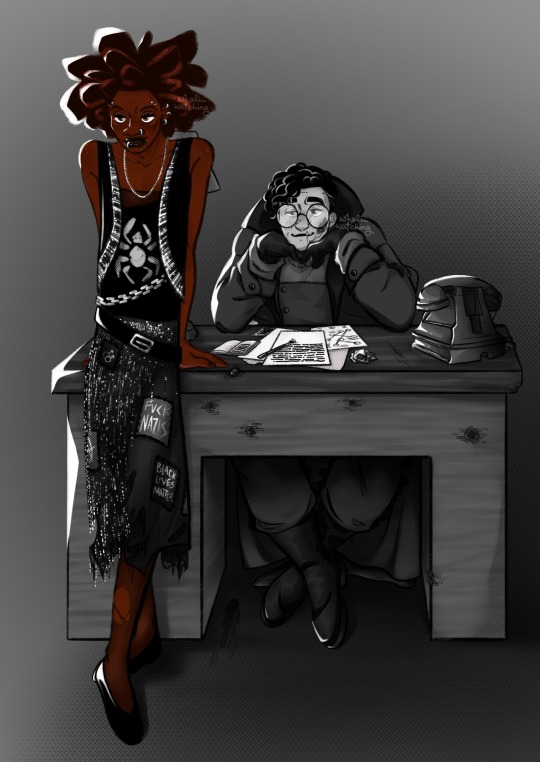
gay people judging you
#spider man: across the spider verse#spider punk#spider noir#hobie brown#noirpunk#hobie wanted to help solve a murder#.. he wanted to be the girl friday#frankly its a miracle peter can concentrate#he’d be tripping all over himself over hobie if he weren’t sitting down lol#but they’re fucking with a rich asshole client probably so he’s not too distracted#case fic where they’re making moony eyes at each other over the corpse and clues <333#i choose to believe hobie likes detective fiction specifically sherlock ‘the police are idiots’ holmes#that’s partially projection tho :’)#at least i can admit it
742 notes
·
View notes
Text
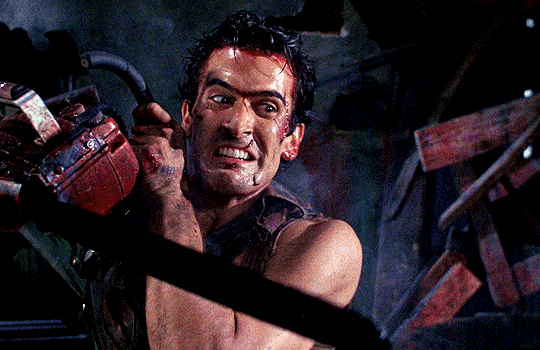
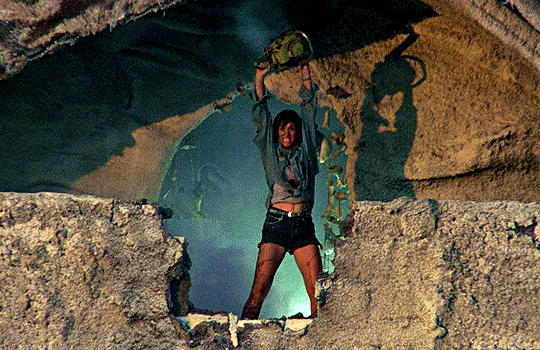


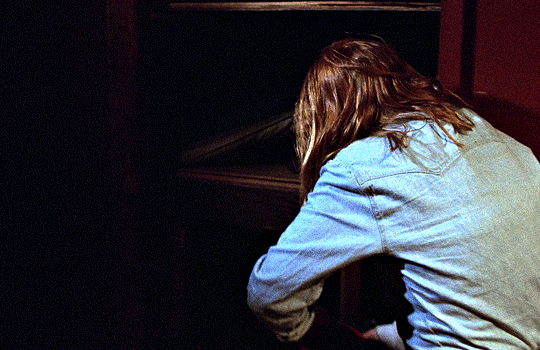
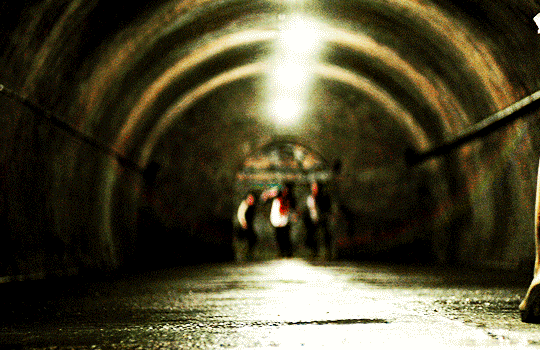
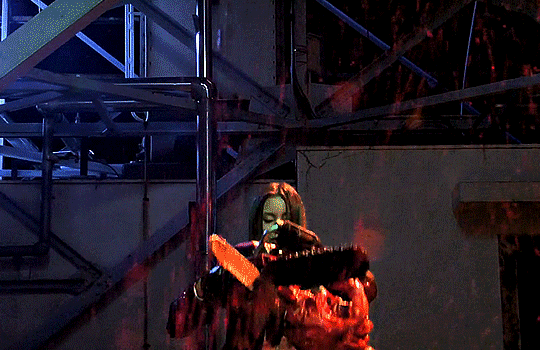
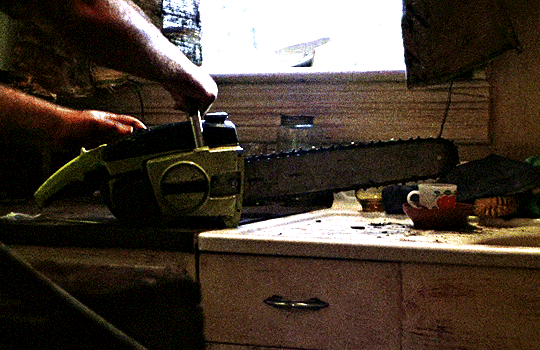

CHAINSAWS IN HORROR MOVIES 🪚
Evil Dead II (1987)
The Texas Chainsaw Massacre 2 (1986)
Motel Hell (1980)
Mandy (2018)
Friday the 13th Part 2 (1981)
[•REC]³: Genesis (2012)
Tokyo Gore Police (2008)
The Texas Chain Saw Massacre (1974)
Evil Dead Rise (2023)
#evil dead#texas chainsaw massacre#tcm#motel hell#mandy#mandy 2018#friday the 13th#rec#tokyo gore police#movieedit#horroredit#junkfooddaily#horrorfilmgifs#horrortvfilmsource#horror#blood#mine#🪚#still lamenting over the lack of a chainsaw emoji </3
973 notes
·
View notes